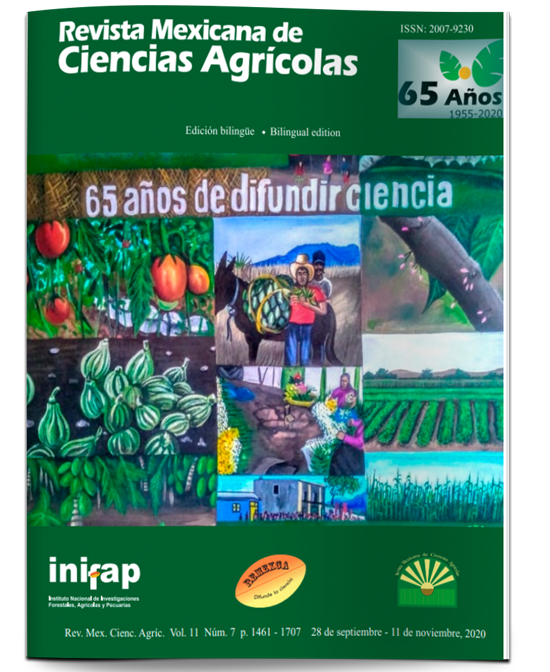Acclimatization and transplantation of Agave angustifolia Haw. vitroplants in wild conditions
DOI:
https://doi.org/10.29312/remexca.v11i7.2403Keywords:
Agave angustifolia, micropropagation, subtropical scrub, survivalAbstract
Agave angustifolia Haw. it has been used in a traditional way in Sonora, for the elaboration of the Bacanora spirituous drink. As a consequence of the legalization of this distillate, wild populations are threatened by overuse. To contribute to this problem, the objective of this study was to evaluate the behavior of A. angustifolia vitroplants during their acclimatization to different substrates and transplantation under wild conditions. Four clonal lines (LC15s, LC26s, LC23b and LC24b) were evaluated in four substrates (control: sand, ‘clay soil’ and gravel (3:1:1); treatment I: peat: control mixture (1:1); treatment II: potting soil: control mixture (1:1) and treatment III: peat: potting soil: control mixture (1:1:1). The transplant site was characterized by analysis of vegetation and physical and chemical soil in situ, while the climate with cartography. These biotic and abiotic characteristics defined the transplantation of 1 000 vitroplants, 250 per clone, in three sections of a hillside with subtropical scrub. Height, number of leaves and cover of the agaves were monitored in a period of 66 weeks. After 60 d, the vitroplants were acclimatized with 100% survival in all treatments. The substrate with the highest content of organic matter favored rooting and root growth. The transplant reached a survival of 84 a 98%, under conditions wild with organic management. The response of the clonal lines was dissimilar during acclimatization and transplantation. The stages of the project were developed between 2009 and 2016.
Downloads
Downloads
Published
How to Cite
Issue
Section
License
The authors who publish in Revista Mexicana de Ciencias Agrícolas accept the following conditions:
In accordance with copyright laws, Revista Mexicana de Ciencias Agrícolas recognizes and respects the authors’ moral right and ownership of property rights which will be transferred to the journal for dissemination in open access. Invariably, all the authors have to sign a letter of transfer of property rights and of originality of the article to Instituto Nacional de Investigaciones Forestales, Agrícolas y Pecuarias (INIFAP) [National Institute of Forestry, Agricultural and Livestock Research]. The author(s) must pay a fee for the reception of articles before proceeding to editorial review.
All the texts published by Revista Mexicana de Ciencias Agrícolas —with no exception— are distributed under a Creative Commons License Attribution-NonCommercial 4.0 International (CC BY-NC 4.0), which allows third parties to use the publication as long as the work’s authorship and its first publication in this journal are mentioned.
The author(s) can enter into independent and additional contractual agreements for the nonexclusive distribution of the version of the article published in Revista Mexicana de Ciencias Agrícolas (for example include it into an institutional repository or publish it in a book) as long as it is clearly and explicitly indicated that the work was published for the first time in Revista Mexicana de Ciencias Agrícolas.
For all the above, the authors shall send the Letter-transfer of Property Rights for the first publication duly filled in and signed by the author(s). This form must be sent as a PDF file to: revista_atm@yahoo.com.mx; cienciasagricola@inifap.gob.mx; remexca2017@gmail.
This work is licensed under a Creative Commons Attribution-Noncommercial 4.0 International license.



